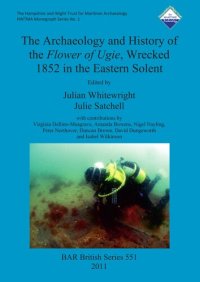
Ebook: The Archaeology and History of the Flower of Ugie, Wrecked 1852 in the Eastern Solent
- Series: BAR British Archaeological Reports British Series 551
- Year: 2011
- Publisher: BAR Publishing
- Language: English
- pdf
This monograph presents an account of the archaeological and historical investigation of the seabed remains of the Flower of Ugie, a wooden sailing vessel built in Sunderland in 1838 and wrecked in the Eastern Solent, England in 1852. The vessel was discovered in 2003 when a fisherman snagged his nets on the wreck, following initial investigation by the Hampshire and Wight Trust for Maritime Archaeology (HWTMA), on-going survey was conducted on the site between 2004 and 2008. The shipwreck lies within anarea that is licensed for aggregate extraction, placing the remains under potential threat from such activity. Liaison with the dredging company led to the establishment of a voluntary dredging exclusion zone around the site. The shipwreck lies in three main parts comprising two large sections of hull remains, with a dispersed area of broken, mainly concreted iron elements in between. The vessel is primarily constructed from oak, ebony and elm. At the time of sinking, the exterior of the hull was sheathed in yellowmetal. It was not possible to date the vessel through dendrochronology, but comparative analysis of the metal fastenings allowed a provisional date of c. 1820-1850 to be assigned. A provisional tonnage of 350 old tons was suggested. There are few artefacts from either the vessel's cargo or on-board items surviving.